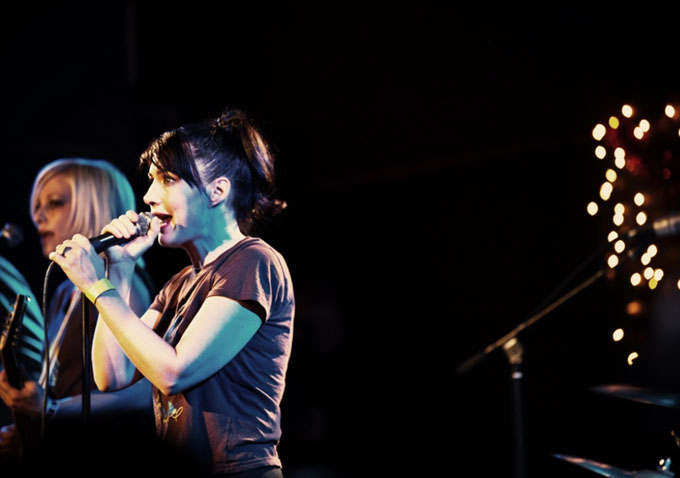
1991 was the year punk broke, hurtling Sonic Youth, Nirvana and their contemporaries into the mainstream, but unless you were plugged into the still-vibrant underground—going to house shows, basement gigs or concerts in unlikely venues like bowling alleys—you likely didn’t know about Bikini Kill. That same year, the Olympia, Washington-based quartet issued their first EP, Revolution Girl Style Now!, and it was a shot to the heart of a scene that perhaps wasn’t aware it needed waking up. Fronted by Kathleen Hanna, the outspoken group may not have been the most technically proficient musicians or boasted the slickest production, but they were vital in a way few groups could claim. They were about to become the reluctant torch-bearers of a revolution, with Kathleen Hanna at the center of the storm.
To understand the world that Bikini Kill were coming into, one has to take the early ’90s into context. Politically, the country was in the Bush era, and the headlines were then dominated by the Clarence Thomas, the revelations about his actions toward Anita Hill and William Kennedy Smith‘s rape trial. Before Kurt Cobain would turn everything on its head, the music charts were still in the hangover of the ’80s, where hair bands and glossy pop provided empty hit tunes. To be a woman in this landscape was likely an eerie experience. At that time (just as now), there was little to be optimistic about in the White House, and culturally (just as now), there were few prominent artists, let alone those that were speaking directly, powerfully and critically of the experience of being a woman and addressing issues of patriarchy, sexism and more. And Bikini Kill—direct, abrasive and no holds bared—filled that vacuum with punchy punk rock songs led by Hanna’s unmistakable, still-hair-raising banshee howl.

Directed by Sini Anderson, “The Punk Singer” makes its intentions clear from the title alone; though told through the reminiscences of the circle of artists and allies who know Hanna, this isn’t the story of an instant hero to third-wave feminism. Instead, it’s a layered portrait of a complex, constantly evolving woman who found herself thrust forward as the public face of a movement. While the art school/stripper background makes for easy copy for the lazy chronicler of this time (and indeed, mainstream outlets often reduced Hanna and her peers as nothing more than victims with guitars), “The Punk Singer” does an excellent job of underscoring that Hanna, Bikini Kill and the other artists and voices of what would become known as Riot Grrl (a catchall for the alternative feminist action of that time) weren’t necessarily exorcising personal demons, but creating a specific space—one that was safe, open and crucially focused on the issues women weren’t able to address comfortably elsewhere.
However, there is a difference between being politically active and politically didactic, and where “The Punk Singer” really excels and truly fascinates is in its detailing of Hanna’s post-Bikini Kill years—moving to lo-fi solo project Julie Ruin and then to super-charged electronic dance outfit Le Tigre. The documentary captures the story in ways many print accounts of Hanna’s career have failed to do, making clear how each stylistic change saw Hanna finding new outlets to express the concerns she was dealing with politically and personally (with natural overlap between the two). Where many “political” musicians often get stuck sloganeering or sticking to a particular, unbending expressive vehicle for their views, what often goes unappreciated in Hanna’s work is how courageously she has stopped and rethought everything from the ground up, almost fearlessly, throughout her career.
What emerges through the documentary (and via the participants including Kathi Wilcox, Tobi Vail, Corin Tucker, Carrie Brownstein, Kim Gordon and many many more) is Hanna’s sheer bravery and uncompromising forthrightness as the qualities that make her truly unique. However, they would also serve as her greatest weakness. So bound up in her own identity as a fighter and an artist, Hanna reveled at being the master of her own fate; but when life-threatening illness struck, it was almost inconceivable to her that something outside her control could dare to possibly take her off the stage. And it’s moving to see someone of Hanna’s stature humbled, but still undefeated—able to finally ask for help, but also have the strength of character to recognize there are some things you can’t do alone.

Early on in “The Punk Singer,” Hanna recalls a Time magazine cover from June 29, 1998 which gallingly asked, “Is Feminism Dead?” and how it spurred her to continue her work. Now, nearly twenty years later—when the Equal Rights Amendment is still something that has yet to pass Congress, when the word “feminist” has become a pejorative—”The Punk Singer” is a reminder that the music world needs someone to make rock ‘n roll feel truly dangerous, subversive and life-changing again. Watching Hanna sexualize her own body on stage, take ownership and then truly and powerfully upend the meaning of every gyration, declare with utter conviction and belief every single screamed lyric, and live through real pain and fury, demanding true revolt from behind the microphone, one marvels at how defiant Bikini Hill were, in particular when musical and political complacency was and continues to be so easy.
Finally giving Hanna the proper due she deserves, the solid, well-calibrated, leanly composed (80 minutes long, it rips by in a punk rock burst) and highly enjoyable “The Punk Singer” brings dimension and real shape to a band, era and scene that is often compartmentalized into one or two categories. That it’ll get you wanting to start your own musical rebellion is a bonus. [B+]

